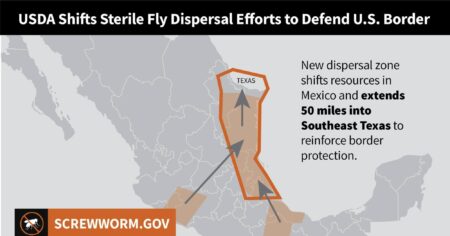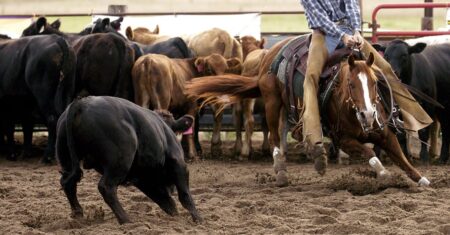The Environmental Protection Agency (EPA) and Army Corps of Engineers released a proposed new waters of the U.S. (WOTUS) rule on Monday.
According to official documentation, the proposed rule is intended to “provide greater regulatory certainty and increase Clean Water Act program predictability and consistency by clarifying the definition of “waters of the U.S.” There will be a public comment period on the proposal for 45 days after it is published in the Federal Register.
The proposed rule has pleased agricultural groups, but environmental groups are “sounding the alarm” about it. Here’s a closer look.
Agricultural Groups
American Farm Bureau Federation
The American Farm Bureau Federation (AFBF) is the nation’s largest farmer-run organization and serves farmers in all 50 states.
On Monday, AFBF President Zippy Duvall commented on the rule.
“Clean water is a top priority for farmers and ranchers — we depend on it. We are pleased that the new rule protects critical water sources while respecting the efforts of farmers to protect the natural resources they’ve been entrusted with.
“The Supreme Court clearly ruled several years ago that the government overreached in its interpretation of what fell under federal guidelines. We are still reviewing the entire rule, but we are pleased that it finally addresses those concerns and takes steps to provide much-needed clarity. We look forward to providing comments to EPA to ensure farmers can continue to safeguard the environment while growing the food America’s families rely on.”
American Soybean Association
The American Soybean Association (ASA) represents U.S. soybean farmers on domestic and international policy issues. ASA has 26 affiliate state associations representing 30 soybean-producing states and nearly 500,000 soybean farmers.
The ASA “applauded” the EPA and U.S. Army Corps of Engineers for their proposed rule in a statement Monday.
“Soybean farmers have been asking for a WOTUS definition we can actually put to work on the ground,” said Caleb Ragland, ASA President and Kentucky farmer. “For too long, shifting interpretations have created real uncertainty about whether everyday decisions might trigger federal oversight. We appreciate that the administration, along with Administrator Lee Zeldin and Assistant Secretary of the Army for Civil Works Adam Telle, is moving toward a definition that reflects how water interacts with working farmland and respects the conservation practices growers already use. Aligning the rule with the Supreme Court’s Sackett decision and preserving long-standing exemptions for normal farm work gives producers clearer expectations and reduces the risk of costly delays or compliance surprises.”
The statement ended noting, “ASA will review the proposal in detail, but this is an important step toward providing farmers the predictability they need to manage their land responsibly and keep delivering food, feed, and fuel for America and the world.”
National Association of State Departments of Agriculture
The National Association of State Departments of Agriculture (NASDA) is a nonpartisan, nonprofit association which represents the elected and appointed commissioners, secretaries, and directors of the departments of agriculture in all 50 states and four U.S. territories.
NASDA commented Monday, stating the EPA and the Army Corps of Engineers have “duly recognized states’ expertise in managing and protecting local land and water resources.”
“NASDA appreciates EPA listening to input from state departments of agriculture and other stakeholders regarding problems with prior WOTUS rulemakings. NASDA is pleased that our federal colleagues are now working cooperatively with state co-regulators to ensure the goals of the Clean Water Act are met while minimizing unjustified interference with agricultural and other activities that feed, clothe, and house Americans and drive our nations’ economy,” NASDA CEO Ted McKinney said.
“NASDA is excited to properly re-engage with EPA under cooperative federalism to ensure our local water resources are protected and farmers have the information and resources they need to make the best decisions about how to manage their land.”
“NASDA will continue to review the proposed rule and intends to offer detailed comments in due course,” the statement concluded.
National Cattleman’s Beef Association
The National Cattleman’s Beef Association (NCBA) has represented America’s cattle producers since 1898 and is the largest association of cattle producers in the U.S.
NCBA announced support for the rule Monday in a statement.
“[WOTUS] has been a longstanding and frustrating issue for family farmers and ranchers. Every few years, the definition of a ‘water of the U.S.’ has changed. Often, this meant that small water features like prairie potholes or dry ditches suddenly fell under federal regulation,” said NCBA President and Nebraska cattleman Buck Wehrbein. “NCBA has spent years fighting to protect cattle producers from excessive red tape. We went to the EPA, advocated on Capitol Hill, and even took this issue all the way up to the Supreme Court to protect our members from federal overreach. We appreciate the EPA finally fixing previous WOTUS rules and supporting America’s family farmers and ranchers.”
“Today’s WOTUS announcement finally acknowledges that the federal government should work to protect lakes, rivers, and oceans, rather than regulating ditches and ponds on family farms and ranches,” said NCBA Chief Counsel Mary-Thomas Hart. “NCBA is pleased to see the EPA stand up for cattle producers, and we look forward to providing input on this proposed rule.”
According to the statement, “NCBA and its state affiliate partners will submit comments to the agency on the rule, which will be considered before the rule is finalized.”
Waters Advocacy Coalition
The Waters Advocacy Coalition (WAC) is made up of farmers, homebuilders, manufacturers, and other job creators. The group released the following statement Monday in response to the rule.
“We applaud EPA and the Corps’ efforts to bring our nation’s job creators one step closer to relief from years of federal government overreach by offering a clear, durable [WOTUS] rule. WAC strongly endorses the agencies’ commitment to respect the legal boundaries articulated by the Supreme Court and to restore the balance Congress intended more than 50 years ago when it enacted the Clean Water Act.
“The Waters Advocacy Coalition represents America’s job creators who deliver the services families rely on every day; from producing energy [and] building homes and infrastructure, to growing food. These industries need regulations they can understand. We look forward to more closely analyzing the proposal and offering comments to ensure that this rule protects America’s waterways while offering certainty to landowners throughout the country.”
Environmental Groups
National Wildlife Federation
The National Wildlife Federation (NWF), America’s largest and most trusted conservation organization, works across the country to unite Americans from all walks of life in giving wildlife a voice.
In a statement Monday, NWF said the rule would “protect fewer streams and wetlands from pollution and destruction than at any point since the law’s passage in 1972.”
“We’ve forgotten that we have clean water because of the Clean Water Act,” said Jim Murphy, the NWF’s senior director of legal advocacy. “This rule would further strip protection from streams that flow into the rivers and lakes that supply our drinking water. The wetlands now at risk of being bulldozed filter our water supplies and protect us from floods.
“Revoking these long-standing protections will hit families in their pocketbooks by raising water treatment costs and home insurance rates. This rule will increase the risk of elevated nitrates and cyanotoxins in drinking water, harming our health. Over time, the impacts to water quality, wildlife, and our way of life will be significant. The crisis facing aquatic wildlife will deepen and it will become harder to find places to fish, boat, and swim.”
Waterkeeper Alliance
Waterkeeper Alliance is a global movement united for clean, healthy, and abundant water for all people and the planet.
The group released a statement Monday “sounding the alarm” about the draft rule.
“Every rollback threatens the water we drink, the rivers we fish, and the wetlands that protect our communities and ecosystems,” said Kelly Hunter Foster, Senior Attorney for Waterkeeper Alliance. “EPA’s new draft WOTUS rule continues to prioritize corporate interests by compromising the already weakened protections for thousands of water bodies across the country. This isn’t abstract policy, it’s a deliberate decision that disregards the real consequences for people’s health, safety, and daily lives. Waterkeeper Alliance will keep fighting for the clean water that we all need and deserve.”
Editor’s note: Some of the previous statements have been edited and/or condensed by Successful Farming for style and clarity.












